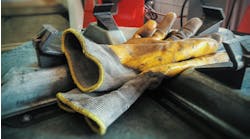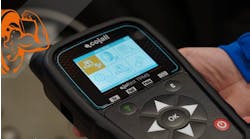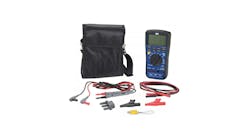Many fleet and shop employees rely on rental shop towels for heavy duty cleaning tasks, washing parts or even cleaning dirt or grease off their hands and faces. The problem is that rental shop towels are not hygienic, safe or efficient, and an organization could be spending too much on them.
While shop towel cleanup seems as easy as sending soiled towels off to a laundering service, a company won’t get the same towels back, and that could expose its employees “to unknown contaminants,” says Trevor Kelley, product manager for SCA’s AfH Professional Hygiene business in North America. SCA is the maker of the Tork brand of wipers, towels, tissue, skincare and napkins (www.torkusa.com).
Most shop towels are interchanged between a variety of shops and factories in different industries where they pick up oil, grease and toxic heavy metals, he explains. When the towels are laundered, the contaminants mix into the wash water and are re-deposited onto “clean” towels. When used, the contaminants and metal filings from the towels can then be transferred onto hands and faces, with the potential of injuring employees.
RELATIVE BENEFITS
One alternative to rented shop towels is disposable wipers.
These are “a safe, efficient and high-performing alternative, ideal for wiping water, oil, grease, dirt and other dust particles,” says Kelley. In addition, “they can be thrown away, eliminating the dangers associated with used towels.
“Using a disposable wiper is the most hygienic and safe option, because you get a fresh towel every time.”
A variety of hygienic wiper options exist, designed specifically for different cleaning tasks.
For example, Tork Premium ShopMax Wet Wipe hand cleaners are “tough on dirt, yet gentle on skin, due to a unique hygienic micro-emulsion formula,” and Tork Industrial Paper Wipers can be used for industrial wiping tasks while being “gentle enough for hand cleaning.”
COSTS
In addition to safety and hygiene benefits, wipers can decrease costs, Kelley says. While rental shop towels appear to be the cheapest option, “you must beware of hidden costs.” For example, laundry services typically charge inventory fees to cover accidental damage or loss, handling and disposal fees and transportation fees.
He observes that chemical solvents are “an expensive part of daily operations. Using shop towels often result in wasted solvents. Conversely, disposable wipers are task-designed to control the release of solvents. If you reduce the use of solvents, you reduce the overall cost of cleaning operations.”
Then there is the environmental impact. Many types of disposable wipers use less water and generate less waste than laundered shop towels. What’s more, many disposable wipers can be used more than once, thus increasing water conservation and further reducing waste products.
“Concerns of proper disposal of wipers that have been exposed to hazardous waste can be put to rest,” he says. “With recently updated EPA legislation, you can dispose those wipers the same way you dispose of other hazardous waste in your facility.”




